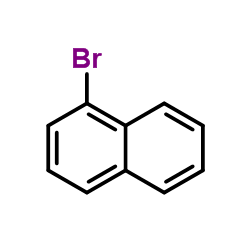1-Bromonaphthalene

1-Bromonaphthalene structure
|
Common Name | 1-Bromonaphthalene | ||
|---|---|---|---|---|
| CAS Number | 90-11-9 | Molecular Weight | 207.067 | |
| Density | 1.489 | Boiling Point | 279-281 ºC | |
| Molecular Formula | C10H7Br | Melting Point | −2-−1 °C(lit.) | |
| MSDS | Chinese USA | Flash Point | 127.8±13.1 °C | |
| Symbol |

GHS07 |
Signal Word | Warning | |
|
Room temperature phosphorescence of alpha-bromonaphthalene induced by cyclodextrin in the presence of hexahydropyridine or 1-ethylpiperidine and its application.
Anal. Chim. Acta 583(2) , 364-9, (2007) Two novel heterocyclic third components, hexahydropyridine (HHP) and 1-ethylpiperidine (EP) were firstly found to enhance room temperature phosphorescence (RTP) of alpha-bromonaphthalene (alpha-BrN) induced by cyclodextrin. The effects of equilibrium time for... |
|
|
Vibrational spectral analysis and first hyperpolarizability studies of 1-bromonaphthalene based on ab initio and DFT methods.
Spectrochim. Acta. A. Mol. Biomol. Spectrosc. 83(1) , 553-60, (2011) In this work, the experimental and theoretical vibrational spectra of 1-bromonaphthalene (1-BN) were studied. FTIR and FT Raman spectra were recorded in the region 4000-400 cm(-1) and 3500-50 cm(-1), respectively. The structural and spectroscopic data of the ... |
|
|
Adhesion of Pseudomonas aeruginosa to silicone rubber in a parallel plate flow chamber in the absence and presence of nutrient broth.
Microbiology 143 ( Pt 8) , 2569-74, (1997) The physico-chemical cell-surface properties of Pseudomonas aeruginosa AK1 and its adhesion to silicone rubber under flow were compared for cells suspended in phosphate-buffered saline (PBS) or PBS supplemented with 2% nutrient broth. Addition of 2% nutrient ... |
|
|
A protocol for determining the surface free energy of dental materials.
Dent. Mater. 20(3) , 262-8, (2004) The purpose of this study was to develop a standard methodology for measuring the surface free energy (SFE), and its component parts, of dental biomaterials.The contact angle of each of four samples of two materials--low density polyethylene and poly(methyl m... |
|
|
Spectroscopic study on binding behaviors of different structural nonionic surfactants to cyclodextrins.
J. Colloid. Interface Sci. 274(2) , 645-51, (2004) The binding of polyethylene glycol (10) n-octylphenyl ether (OPE) and polyethylene glycol (10) tert-octylphenyl ether (Triton X-100, TX) to beta-cyclodextrin (beta-CD) and heptakis(2,3- beta-dimethyl)- beta-CD (DM- beta-CD) was described in detail by surface ... |
|
|
[Comparative study of room-temperature phosphorescence of 1-bromonaphthalene induced by synergetic effect of nonionic surfactants and beta-cyclodextrin].
Guang Pu Xue Yu Guang Pu Fen Xi 24(4) , 402-6, (2004) Room-temperature phosphorescence of 1-BrN induced by a combination of OPE-10 and Triton X-100 with beta-CD was comparatively studied. In terms of molecular size and dimensions of beta-CD, the octyl group and phenyl group of OPE-10 and Triton X-100 were incorp... |
|
|
[Studies on the effects of steric hindrance of guest molecule on the formation of inclusion complexes by molecular luminescence].
Guang Pu Xue Yu Guang Pu Fen Xi 25(2) , 188-91, (2005) Fluorescence and room temperature phosphoresce (CD-RTP) induced by cyclodextrin methods were employed to investigate the effects of steric hindrance of guest molecule on the formation of inclusion complexes of beta-cylcodextrin (beta-CD) and bromonaphthalene ... |
|
|
High quality dispersions of hexabenzocoronene in organic solvents.
J. Am. Chem. Soc. 134(29) , 12168-79, (2012) We have studied the exfoliation and dispersion of hexabenzocoronene (HBC) in 28 different solvents. We see a wide range of dispersed concentrations and aggregation states, all of which can be related to the solvent properties. To a first approximation, the di... |